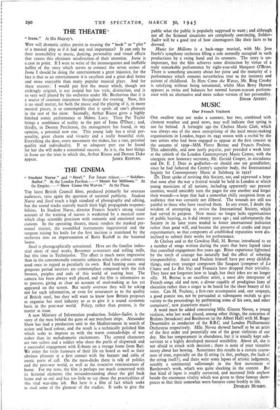ONE swallow may not make a summer, but two, combined
with clement weather and good news, may well indicate that spring is not far behind. A fortnight ago the Chelsea Music Club, which was always one of the most enterprising of the local music-making organisations in London, began its 1945 season with a recital by the two artists who had been engaged to appear at the first Concert in the autumn of 1939—MM. Pierre Bernac and Francis Poulenc. This admirable, and now justly popular, pair presided a week later at the rebirth of the London Contemporary Music Centre, with the energetic new honorary secretary, Mr. Gerald Cooper, in attendance and Dr. E. J. Dent as godfather—or should one say grandfather, since he had fathered the Centre's superior body, the International Society for Contemporary Music at Salzburg in 1922?
Dr. Dent spoke of reviving this Society, too, and expressed a hope that soon after the war a festival would be held in London at which young musicians of all nations including apparently our present enemies, would amicably turn die pages for one another and forget their wounds—a hope that had a somewhat chilly reception from an audience that was certainly not illiberal. The wounds are still too painful to those who have received them. In any event, I doubt the wisdom of attempting to revive the International Society, which had served its purpose. New music no longer lacks opportunities of public hearing, as it did twenty years ago ; and unfortunately the Society in its later years tended to foster international jealousies rather than good will, and became the preserve of cranks and mere experimenters, so that composers of established reputation were dis- inclined to submit their works for performance.
At Chelsea and at the Cowdray Hall, M. Bernac introduced to us a number of songs written during the years that have lapsed since that cancelled engagement five years ago. Bitter experience lightened by the torch of courage has naturally had the effect of sobering irresponsibility. Auric and Poulenc himself have put away childish things, and even younger composers like Sauguet (composer of La Chatte and Le Roi Nu) and Francaix have dropped their triviality. They have not forgotten how to laugh, but their jokes are no longer silly. M. Bernac is an excellent artist, a most able interpreter of French songs old and new, a diseur capabk of prodigious feats of elocution rather than a singer to be heard for the sheer beauty of his voice. Can M. Poulenc, a first-rate accompanist and, one suspects, a good pianist too, not be persuaded at subsequent recitals to give variety to the proceedings by performing some of his own, and other composers', new pianoforte music?
A word must be added concerning Mlle. Ginette Neveu, a young violinist, who last week played, among other things, the concertos of Brahms (broadcast) and Beethoven (at the Albert Hall) with M. Roger Descumiere as conductor of the B.B.C. and London Philharmonic Orchestras respectively. Mlle. Neveu showed herself to be an artist of the first order and potentially one of the great violinists of our day. She has temperament in abundance, but it is usually kept sub- servient to a highly developed musical sensibility. Above all, she is not afraid to attack with decision ; there is none of your tentative nicety about her bowing. Sometimes this results in a certain coarse- ness of tone, especially on the G string (is this, perhaps, the fault of
the string itself?), and there were e some lapses of artistic judgement, notably a sentimental rallentand o in the first movement of Beethoven's work, which was quite shocking in the context. But that kind of lapse is readily corrected, and mattered little anyhow beside the enormous vitality which was given to these famous show- pieces so that their somewhat worn features came freshly to life, DYNELEY HUSSEY.






















 Previous page
Previous page